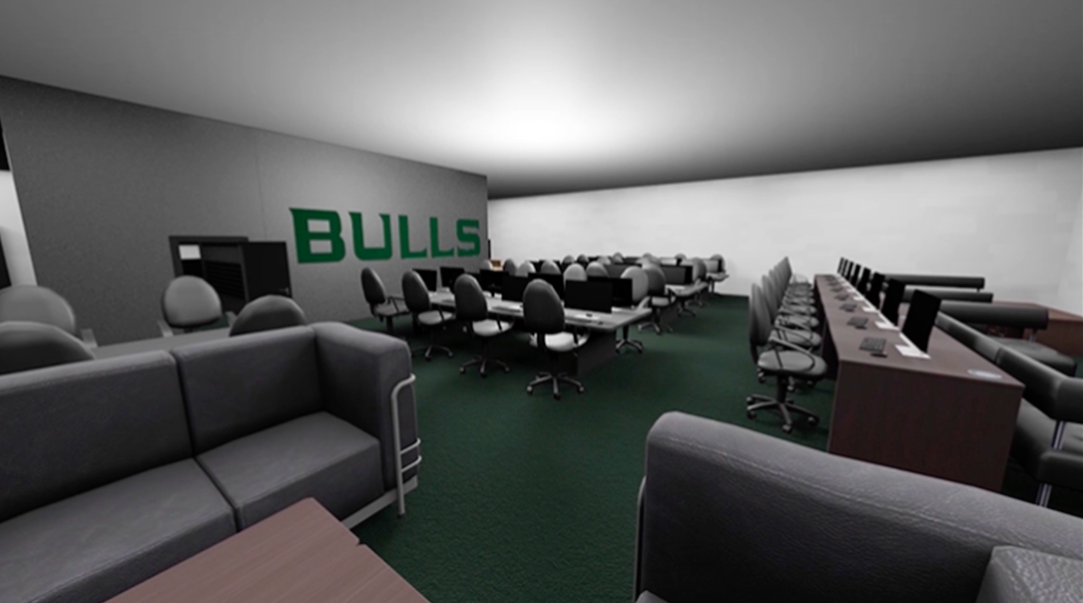USF Esports program to open physical gaming space at the Tampa campus

The USF Esports program will create a physical expansion in spring 2022 at the Esports Living Lab at the Tampa campus in hopes of combating financial and diversity barriers in the gaming industry.
Located inside the Recreation and Wellness Center, the 2,500-square-foot lab will hold 40-50 PCs and consoles with their full setup of equipment. The plan is to have spaces for recreational and competitive gaming as well as for content creation in the center.
The primary space will be mainly used for academic purposes during the day and transition to open recreation in the mid-afternoon through the night. The smaller rooms, which are separated from the main one, will support competitive teams with coaching, as well as space to practice and compete. The rooms will also be used for broadcast production so students can cast esports events using platforms such as Twitch.
Funds for the project, which will cost about $500,000 including space and equipment, will come from a part of the technology fee Student Government approved in 2018, and money from the capital improvement trust fund, which will become available in October. Antonio Gonzalez, assistant director of the sports programs and outdoor facilities, said he had been working with student leaders and campus partners for three years to formalize the space.
“We wanted to be very cautious about hyping up the space until we knew that everything was in place and there was no chance of us disappointing students with false timelines or being unable to complete the project,” Gonzalez said. “This is as sure as we have ever been and we are excited to see this project come to fruition.”
All the details haven’t been set yet, such as the days and times the lab will be open, but the competitive space of the lab will host the games from the 10 active esports clubs at USF including League of Legends, Overwatch, Super Smash Bros., Call of Duty, Rocket League, Dota, Counter-Strike: Global Offensive (CS: GO), Tom Clancy’s Rainbow Six Siege, VALORANT and trading card games.
The space, however, will not be restricted to club members only. All students will have access to the lab, enabling those with financial difficulties to enjoy a hobby that can be expensive due to the cost of equipment and games.
Eliminating the financial and access barriers is one of the main purposes of the project, Gonzalez said.
“If you were a student who is interested in gaming, you wouldn’t have to have an initial financial investment into the space,” Gonzalez said. “You could go into the space and play a game, be able to see if this is something that you’d be interested in pursuing further.”
The space also has the potential to combat diversity issues that exist within esports such as the lack of visibility of minorities and women in the gaming industry, he said. There have been talks to host events targeted to communities that are underrepresented in esports, Gonzalez said, so they can use the equipment.
Sarah Lynch, marketing program assistant for sports programs on the Tampa campus and student moderator for the esports program, said she is excited to see the students that don’t fit the gamer stereotype but that are part of the esport community at USF using the space. Among the 2,500 students in the USF Esports Discord group, she said many are women and international students.
“We’ve got such incredible diversity,” Lynch said. “We’ve got so many amazing women working in this space. It is just genuinely a safe space for … busy gamers, whether they fit in that [stereotype] or not.”
Gamers tend to lock themselves in their apartments and interact with other players virtually, Lynch said. But the new space will allow them to remember there are real people behind the screens.
“Sometimes your four walls of your room can get exhausting. You want to go somewhere new. You want to see other students. You want to look into their eyes,” Lynch said. “It’ll be nice to have students connecting with one another, basically the old-fashioned way, but with a new twist. So I’m definitely excited.”
Gonzalez said the esports program hopes to provide a physical space where students can meet, especially since many probably met while all activities were transitioned online as esports was one of the safe activities to do.
“What we’re doing is providing those same people who probably only meet online a physical space to go into,” Gonzalez said. “So they can actually meet other students and have the same passion, that same enjoyment that they have in the activity.”
Many students are attracted to the online spaces esports provide because they feel safe, Lynch said. She said individuals are able to create their own circles and escape for a while from their daily routines.
“What attracts so many students is that it doesn’t feel like school, but they feel like they belong here,” Lynch said. “And that’s really what we wanted to create, and this physical space that we’re building, it’s an extension of that. So you can see that diversity in person. And you can see that comfort space in a physical place.”







